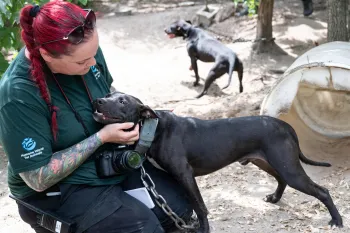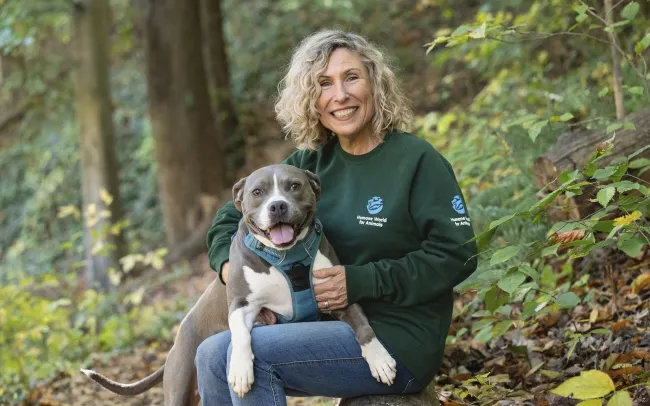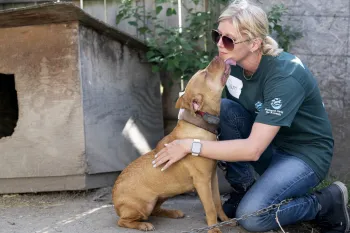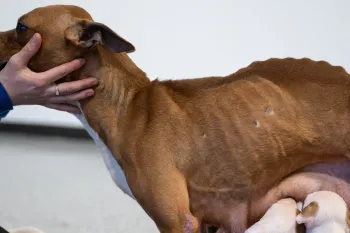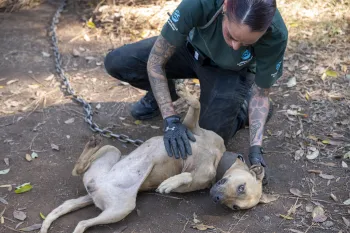On June 12, members of our animal rescue team joined South Carolina State Law Enforcement Division (SLED) agents at two properties associated with an alleged dogfighting operation in Richland County. Together, they rescued 23 dogs and puppies from circumstances of apparent neglect and injuries consistent with dogfighting.
We’ve worked directly with SLED and other South Carolina agencies on three dogfighting cases in recent years, including a 2022 deployment involving the rescue of 275 dogs at multiple properties involved in a suspected dogfighting network. We’ve also worked hard to support the development of an effective law enforcement strategy for tackling dogfighting in South Carolina.
Through our Law Enforcement Training Center (LETC), we have provided more than 50 advanced education and training sessions to law enforcement officials across the state. We’ve also helped the South Carolina Criminal Justice Academy provide instruction on animal cruelty and fighting issues. This is the kind of professional training that LETC and our animal rescue team offer worldwide—to better inform and equip law enforcement officers responsible for investigating dogfighting.
South Carolina treats dogfighting as a criminal offense in its own right. At the same time, government officials there understand that it is often connected to other serious crimes, like illegal gambling, drug trafficking, weapons violations and violent interpersonal assault.
One of those officials, Governor Henry McMaster, has been a strong opponent of dogfighting since his election as South Carolina’s Attorney General in 2003. During the period of 2003-2011, his office carried out many successful prosecutions of alleged dogfighters. As South Carolina’s governor from 2017 to the present, he has done still more, consistently working to increase the state’s capacity to protect animals from a cruelty he has called “far too common in South Carolina.”
Among other actions, McMaster has supported appropriations for adding agents to the SLED Dogfighting Unit, and for covering some of its veterinary expenses. In 2024, after both chambers of the legislature unanimously passed a cost-of-care law, requiring that the accused owner or owners of animals seized by law enforcement agents be responsible for the care of those animals for the duration of a case, McMaster signed it.
We worked hard to help secure passage of the cost-of-care law, which we consider essential to effective collaboration between non-profit organizations and state agencies.
At the Richland County properties, our responders found many of the dogs living outdoors in makeshift shelters, with heavy chains strapped around their necks. It was hot and humid, and some of the dogs lacked access to water. Responders also noticed that some dogs seemed to have attempted to dig holes to gain more shade and protection from the elements. They also found a treadmill, a telltale training staple of dogfighting.
For dogs lucky enough to survive the violence of dogfighting, their lives can vastly improve, so long as we reach them in time. In this instance, we did, thanks to SLED, and the animals we saved are living safely and comfortably at a temporary shelter. There, veterinarians and other caregivers can conduct proper health examinations and start each and every dog on an individual treatment plan for the injuries and ailments associated with the life they’re leaving behind.
These dogs’ lives will change even more dramatically as the weeks turn into months. Despite the animals’ circumstances, and the body scars that act as a reminder of the sad story of their lives, our responders found that many of the dogs were friendly and eager for attention, underscoring their resilience.
Of the animals rescued by our team, a few stood out. One was a dog with open wounds and a leg fracture, apparently never treated. He’s in good spirits and we are keeping him comfortable as our veterinary team makes arrangements for surgical amputation of the leg.
There was also a nursing mother inside a cramped cage with six puppies, their eyes as yet unopened. Their vulnerability and innocence—in a setting so harsh and unforgiving—was moving to every responder.
Puppies generally begin to open their eyes between 7 to 14 days after birth, as their optical nerves are still developing, making them highly sensitive to light. A veterinarian put their age at 10 days old, three days after the six were rescued. One colleague happened to be present when some of them opened their eyes for the first time. Later, she expressed how deeply comforting it was to know that these fortunate pups would never see or know anything like the bleak and desperate environment in which they’d been born—or the violence of the fighting pit.
